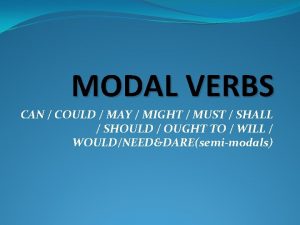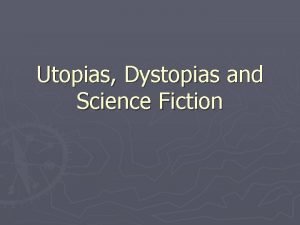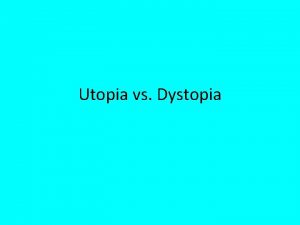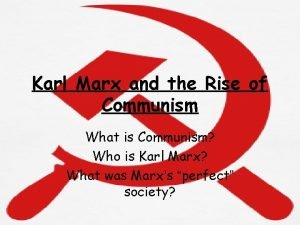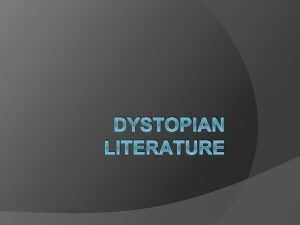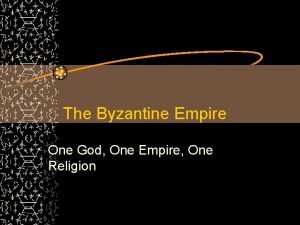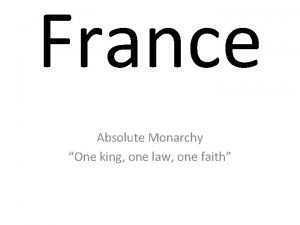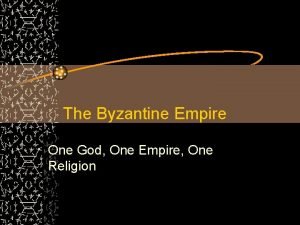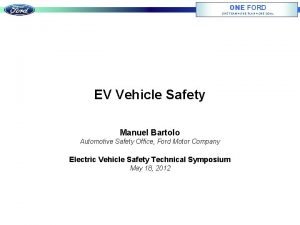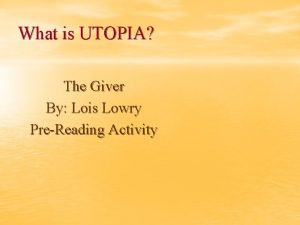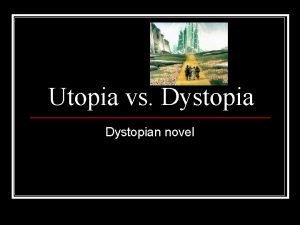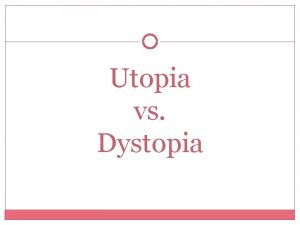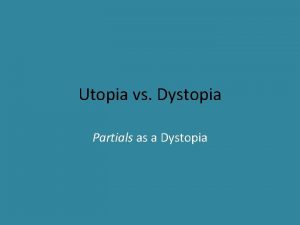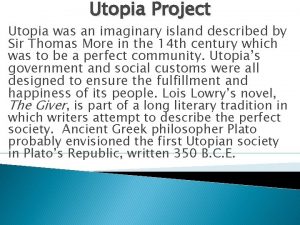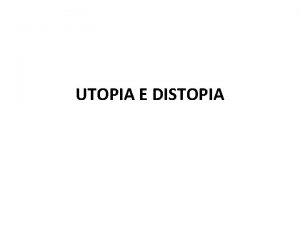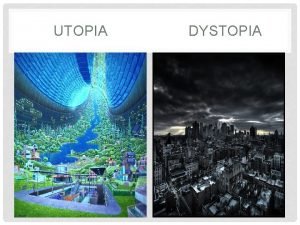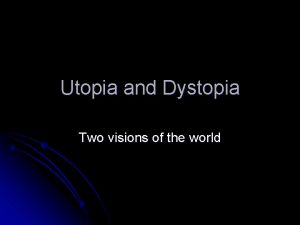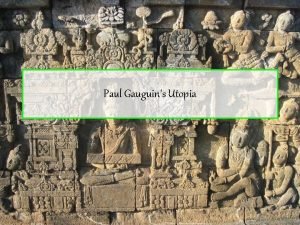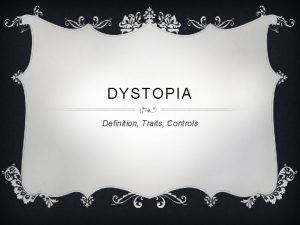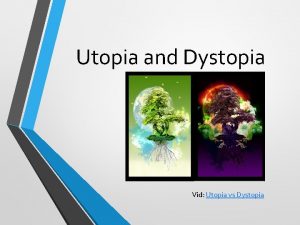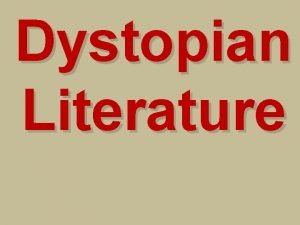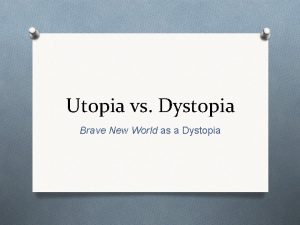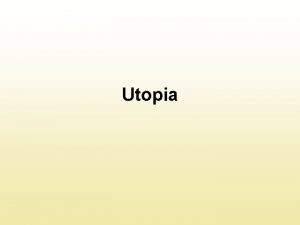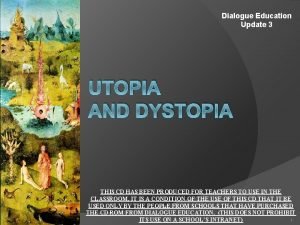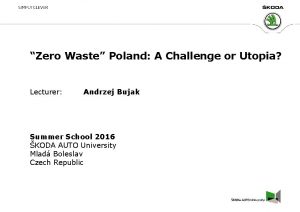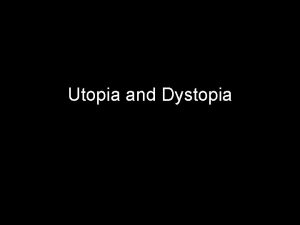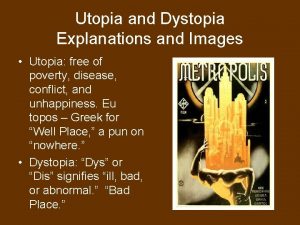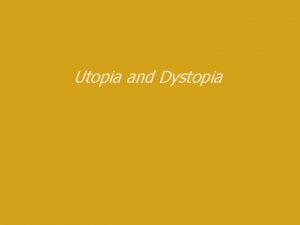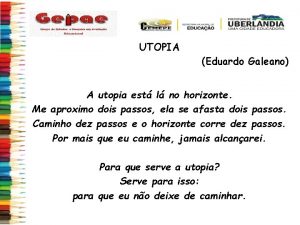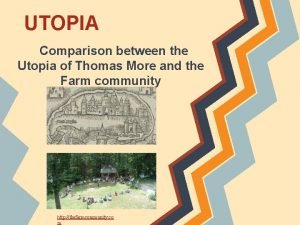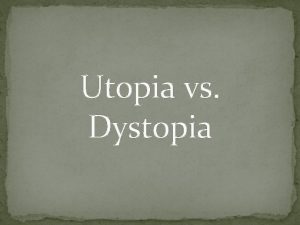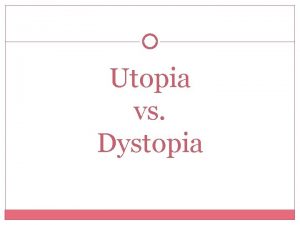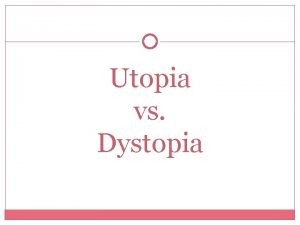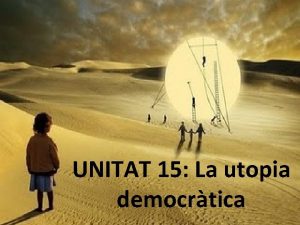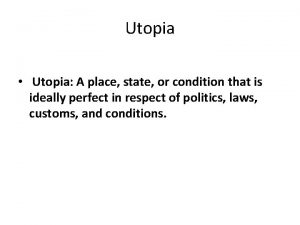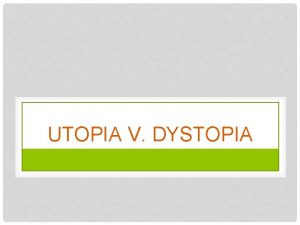Utopia for One Futurity and Community in the










![“[Utopian] socialism is the expression of absolute truth, reason and justice, and has only “[Utopian] socialism is the expression of absolute truth, reason and justice, and has only](https://slidetodoc.com/presentation_image_h/1e10d10bb5161424b6ba50ab30765192/image-11.jpg)



























- Slides: 38

Utopia for One: Futurity and Community in the Age of the Individual

Utopian Blueprint εὐ + τοπος Eu topos: ‘well’ or ‘good’ place

Utopian No Place οὐ + τοπος Ou topos: no place

Utopia: the ‘good place’ that is ‘no place’

Lecture Overview: • The utopian blueprint: how the ‘no place’ was lost • Anti-utopianism and the eternal present of piecemeal improvement • Utopia for one: buying the ‘good place’ for ourselves • Recovering the utopian ‘no-place’


Plan for New Harmony, Indiana Robert Owen

Plan for Phalanstѐre Charles Fourier

Unité d’Habitation Le Corbusier • Designed in the 1920 s • Several built in Europe from the 1940 s 60 s • The design inspired many similar projects around the world

“Geometry is the language of man … This must be the axis along which man is organized, in perfect accord with nature and, probably, with the universe” “The heart will be touched only if reason is satisfied and it can be when things are calculated … A town that is well laid out and built with mass-produced elements will seem calm, ordered, and neat; it will inevitably impose discipline on the inhabitants” Le Corbusier. 1923. Towards A New Architecture. Pp 133 -135; 233; 267 -269
![Utopian socialism is the expression of absolute truth reason and justice and has only “[Utopian] socialism is the expression of absolute truth, reason and justice, and has only](https://slidetodoc.com/presentation_image_h/1e10d10bb5161424b6ba50ab30765192/image-11.jpg)
“[Utopian] socialism is the expression of absolute truth, reason and justice, and has only to be discovered to conquer all the world by virtue of its own power. And as absolute truth is independent of time, space, and of the historical development of man, it is a mere accident when and where it is discovered. With all this, absolute truth, reason and justice are different with the founder of each different school. And as each one’s special kind of absolute truth, reason and justice is again conditioned by his subjective understanding, his conditions of existence, the measure of his knowledge and his intellectual training, there is no other ending possible in this conflict of absolute truths than that they shall be mutually exclusive one of the other. ” Frederick Engels. 1880. Socialism: Utopian and Scientific. pp 43 -44


“That the Utopian method, which chooses an ideal state of society as the aim which all our political actions should serve, is likely to produce violence can be shown thus. Since we cannot determine the ultimate ends of political actions scientifically, or by purely rational methods, differences of opinion concerning what the ideal state should be like cannot always be smoothed out by the method of argument. They will at least partly have the character of religious differences. And there can be no tolerance between these different Utopian religions. Utopian aims are designed to serve as a basis for rational political action and discussion, and such action appears to be possible only if the aim is definitely decided upon. Thus the Utopianist must win over, or else crush, his Utopianist competitors who do not share his own Utopian aims and who do not profess his own Utopianist religion [and] … as far as possible stamp out all memory of them” Karl Popper. 1947. ‘Utopia and Violence’. p 6

“the Utopianist must win over, or else crush, his Utopianist competitors who do not share his own Utopian aims and … as far as possible stamp out all memory of them” Popper “there is no other ending possible in this conflict of absolute truths than that they shall be mutually exclusive one of the other” Engels

“rational political action must be based upon a more or less clear and detailed description or blueprint of our ideal state, and also upon a plan or blueprint of the historical path that leads us towards this goal. I consider what I call Utopianism an attractive and, indeed, an all too attractive theory; for I also consider it dangerous and pernicious. It is, I believe, selfdefeating, and it leads to violence. That it is self-defeating is connected with the fact that it is impossible to determine ends scientifically. There is no scientific way of choosing between two ends. Some people, for example, love and venerate violence. For them a life without violence would be shallow and trivial. Many others, of whom I am one, hate violence. This is a quarrel about ends. It cannot be decided by science. ” Karl Popper. 1947. ‘Utopia and Violence’. p 5 (emphasis added)

Pruitt-Igoe social housing, St. Louis, Missouri. Demolished mid 1970 s.

“As late as the 1990 s, Virginia Bottomley, the UK’s Conservative secretary of state for national heritage, when asked to approve the listing of the Alexander Fleming House complex at London’s Elephant and Castle that had once housed the Ministry of Health, allegedly responded: ‘Oh no, we can’t list that … it’s concrete … it’s communist. ’” https: //www. theguardian. com/cities/2019/feb/27/concrete-its-communist-the-rise-and-fall-ofthe-utopian-socialist-material

Piecemeal Improvement “Work for the elimination of concrete evils rather than for the realization of abstract goods. Do not aim at establishing happiness by political means. Rather aim at the elimination of concrete miseries … Choose what you consider the most urgent evil of the society in which you live, and try patiently to convince people that we can rid of it. But do not try to realize these aims indirectly by designing and working for a distinct ideal of a society which is wholly good. However deeply you may feel indebted to its inspiring vision, do not think that you are obliged to work for its realization, or that it is your mission to open the eyes of others to its beauty … no generation must be sacrificed for the sake of future generations, for the sake of an ideal of happiness that may never be realized … The attainment of happiness should be left to our private endeavours. ” Karl Popper. 1947. ‘Utopia and Violence’. p 7 (emphasis added)


“Thus the good life, as I have said elsewhere, was the Goods Life: it could be purchased. If the whole community no longer offered the conditions for this life, one might filch what one wanted from the general store, and try to monopolize for self or family all that was needed for a good life in the community … As the common possessions of the community dwindle, the private possessions of individuals are multiplied; and at last, there remains no other community than a multitude of anarchic individuals, each of whom is doing his best to create for himself a Country House, notwithstanding the fact that the net result of his endeavours – this is the drab tragedy and the final thing to be said against it – is perhaps nothing better than six inadequate rooms at the end of nowhere in a Philadelphia suburb” Lewis Mumford. 1922. The Story of Utopias. pp 209 -210 (emphasis added)






“What we may be witnessing is not just the end of the Cold War, or the passing of a particular period of postwar history, but the end of history as such: that is, the end point of mankind’s ideological evolution and the universalization of Western liberal democracy as the final form of human government” “The struggle for recognition, the willingness to risk one’s life for a purely abstract goal, the worldwide ideological struggle that called forth daring, courage, imagination, and idealism, will be replaced by economic calculation, the endless solving of technical problems, environmental concerns, and the satisfaction of sophisticated consumer demands. In the posthistorical period there will be neither art nor philosophy, just the perpetual caretaking of the museum of human history. ” Francis Fukuyama. 1989. ‘The End of History? ’. p 3, p 18

Utopia as no place Iconoclastic utopians: Ernst Bloch, Walter Benjamin, Paul Tillich, Martin Buber, Theodor Adorno, Fredric Jameson, Paul Ricoeur … Utopia cannot be made into an image Attempts to construct utopian blueprints are not utopian (this does not necessarily place prohibitions on utopian literature or art, just as long as it is recognised as an artwork, not as a plan to be implemented)

“In an image-obsessed society such as our own, I suggest that the traditional blueprint utopianism may be exhausted and the iconoclastic utopianism indispensable. The iconoclastic utopians resist the modern seduction of images. Pictures and graphics are not new, of course, but their ubiquity is. A curtain of images surrounds us from morning till night and from childhood to old age … “Everything, ” writes theologian Jacques Ellul in his defense of modern iconoclasm, The Humiliation of the Word, “is subordinated to visualization, and nothing has meaning outside it. ” We are living in an “age of extreme visualization. ” Russell Jacoby. 2005. Picture Imperfect: Utopian Thought for an Anti. Utopian Age. p 12



“What then I saw is more than tongue can say. Our human speech is dark before the vision. The ravished memory swoons and falls away. As one who sees in dreams and wakes to find the emotional impression of his vision still powerful while its parts fade from his mind – just such am I, having lost nearly all the vision itself, while in my heart I feel the sweetness of it yet distill and fall. So, in the sun, the footprints fade from snow. On the wild wind that bore the tumbling leaves the Sybil’s oracles were scattered so. O Light Supreme who doth Thyself withdraw so far above man’s mortal understanding, lend me again some glimpse of what I saw; make Thou my tongue so eloquent it may of all Thy glory speak a single clue to those who follow me in the world’s day; Dante’s Paradiso Canto XXXIII for by returning to my memory somewhat, and somewhat sounding in these verses, Thou shalt show man more of Thy victory. So dazzling was the splendor of that Ray, that I must certainly have lost my senses had I, but for an instant, turned away. And so it was, as I recall, I could the better bear to look, until at last my vision made one with the Eternal Good. Oh grace abounding that had made me fit to fix my eyes on the eternal light until my vision was consumed in it! I saw within Its depth how It conceives all things in a single volume bound by Love, of which the universe is the scattered leaves; substance, accident, and their relation so fused that all I could say could do no more than yield a glimpse of that bright revelation.

Martin Buber: I and Thou I-It : Making of things and persons objects, looking on them as closed, finished, as if they were a picture. Has the quality of ‘pastness’ I-Thou: Openness to the present, to an encounter which has not been defined or limited Eternal Present: When we talk of the eternal present, we are actually talking about the past, about a world of objects we claim to know from the outset, as if they were fixed. There is nothing new under the sun etc.

Martin Buber: I and Thou “Shrunk from substance and fulness to a functional point, to a subject which experiences and uses, I approaches and takes possession of all It existing “in and for itself, ” and forms in conjunction with it the other primary word. The man who has become conscious of I, that is, the man who says I-It, stands before things, but not over against them in the flow of mutual action. Now with the magnifying glass of peering observation he bends over particulars and objectifies them, or with the field-glass of remote inspection he objectifies them and arranges them as scenery, he isolates them in observation [30] without any feeling of their exclusiveness, or he knits them into a scheme of observation without any feeling of universality. The feeling of exclusiveness he would be able to find only in relation, the feeling of universality only through it. Now for the first time he experiences things as sums of qualities. From each relational experience qualities belonging to the remembered Thou had certainly remained sunk in his memory; but now for the first time things are for him actually composed of their qualities … This is part of the basic truth of the human world, that only It can be arranged in order. Only when things, from being our Thou, become our It, can they be coordinated. The Thou knows no system of coordination. But now that we have come so far, it is necessary to set down the other part of the basic truth, without which this would be a useless fragment – namely, a world that is ordered is not the world-order. There are moments of silent depth in which you look on the world-order fully present. Then in its very flight the note will be heard; but the ordered world is its indistinguishable score. These moments are immortal, and most transitory of all; no content may be secured from them, but their power invades creation and the knowledge of man, beams of their power stream into the ordered world and dissolve it again and again” Martin Buber. 1923. I and Thou. pp 29 -31

“Philosophy will have conscience of tomorrow, commitment to the future, knowledge of hope, or it will have no more knowledge. ” Ernst Bloch. 1959. The Principle of Hope. p 7

Ernst Bloch: ‘I’ to the ‘We’ “the “intuition of the We, ” the content of its “Magna Carta, ” streams responsibility into the world. To be practical in this way, to help in this way on everyday life’s structural horizon and put things into place, precisely to be political-social in this way, is powerfully near to conscience, and is a revolutionary mission absolutely inscribed in utopia. ” Ernst Bloch. 1918. Spirit of Utopia. p 237

“in the ultimate self-encounter, in the comprehended darkness of the lived moment, as this one thing leaps up and hears itself in the inconstruable, absolute question, the problem of the We in itself. This is as far as the internal path can at first go, namely toward what we call a self-encounter, the preparation of the inner word and helps it break through the falseness of this world. In the end, however, after this internal vertical movement: may a new expanse appear, the world of the soul, the external, cosmic function of utopia, maintained against misery, death, the husk-realm of mere physical nature. Only in us does this light still burn, and we are beginning a fantastic journey toward it, a journey toward the interpretation of our waking dream, toward the implementation of the central concept of utopia. To find it, to find the right thing, for which it is worthy to live, to be organized, and to have time: that is why we go, why we cut new, metaphysically constitutive paths, summon what is not, build into the blue, and build ourselves into the blue, and there seek the true, the real, where the merely factual disappears – incipit vita nova [a new life begins]. ” Ernst Bloch. 1918. The Spirit of Utopia. p 3

What is (or should be) utopian thinking? • An openness to the future – a future unknown, not the future of futurists - based on prediction and modelling, as this merely perpetuates the present • Upholding the idea of an absolute community as opposed to isolated communities • We can think this way by maintaining the value of the ‘no-place’ – of what is not so that we may question what is

Bloch, Ernst. 1959. The Principle of Hope Vol. 3. Trans. Neville Plaice. Cambridge Mass. : MIT Press Buber, Martin. 1958 (1923). I and Thou. Trans. Ronald Smith. Edinburgh: T&T. Clark Engels, Frederick. 1977 (1880). Socialism: Utopian and Scientific. Trans. Edward Aveling. Westport, Connecticut: Greenwood Press Fukuyama, Francis. 1989. ‘The End of History? ’ in The National Interest, no. 16, pp 3 -18 Jacoby, Russell. 2005. Picture Imperfect: Utopian Thought for an Anti-Utopian Age. New York: Columbia University Press Jameson, Fredric. 1998. ‘Comments’ in Utopian Studies, vol 9, no. 2. pp 74 -77 Le Corbusier. 1985 (1923). Towards A New Architecture. Trans. Frederick Etchells. New York: Dover Publications Mumford, Lewis. 1922. The Story of Utopias. Gloucester, Mass. : Peter Smith Popper, Karl. 1986 (1947). ‘Utopia and Violence’ in World Affairs, vol. 149, no. 1. pp 3 -9 REFERENCES Bloch, Ernst. 1918. The Spirit of Utopia. Trans. Anthony Nassar. Redwood City, CA: Stanford University Press
 Will, would, shall, should can, could, may, might
Will, would, shall, should can, could, may, might Asean tourism strategic plan
Asean tourism strategic plan One vision one identity one community
One vision one identity one community Willow cabin speech
Willow cabin speech Utopia and dystopia venn diagram
Utopia and dystopia venn diagram Utopia and dystopia venn diagram
Utopia and dystopia venn diagram Define dystopian society
Define dystopian society Karl
Karl Utopia and dystopia venn diagram
Utopia and dystopia venn diagram Dystopia definition in literature
Dystopia definition in literature One empire one god one emperor
One empire one god one emperor One one little dog run
One one little dog run One king one law one faith
One king one law one faith One empire one god one emperor
One empire one god one emperor Ford one plan
Ford one plan See one do one teach one
See one do one teach one See one, do one, teach one
See one, do one, teach one Studiendekanat uni bonn
Studiendekanat uni bonn The giver utopia
The giver utopia Utopia vs dystopia
Utopia vs dystopia Political utopia
Political utopia Utopia vs dystopia
Utopia vs dystopia Deasybib
Deasybib Utopia regressiva
Utopia regressiva Dystopia
Dystopia Describe utopia
Describe utopia Define distopia
Define distopia The giver utopia project examples
The giver utopia project examples Paul utopia
Paul utopia Dystopian etymology
Dystopian etymology Dystopia traits
Dystopia traits Utopia 1984
Utopia 1984 Perfect society
Perfect society What is a utopia
What is a utopia The challenge of utopia
The challenge of utopia Is brave new world a dystopia or utopia
Is brave new world a dystopia or utopia Tomasz morus cytaty
Tomasz morus cytaty Negative utopia vs dystopia
Negative utopia vs dystopia Utopia waste management
Utopia waste management
